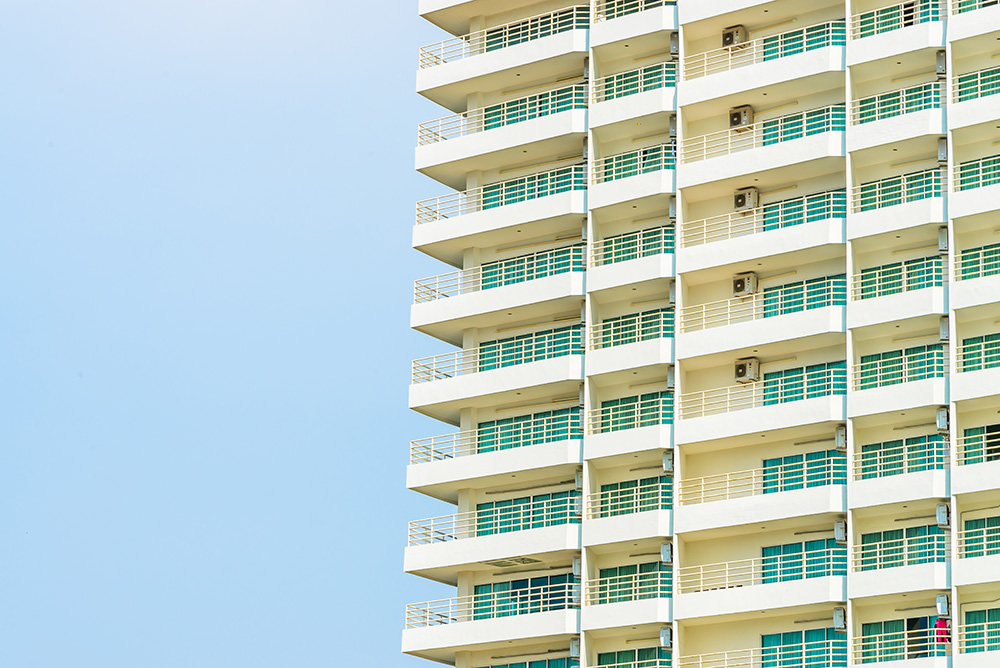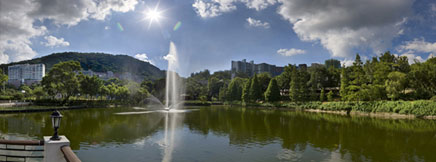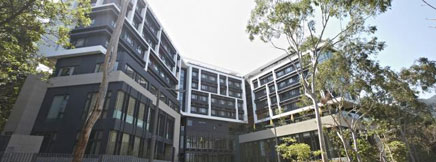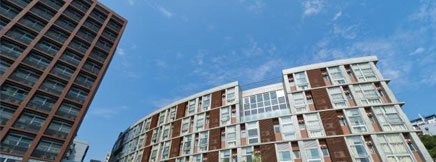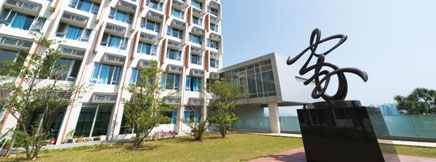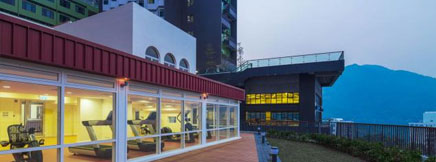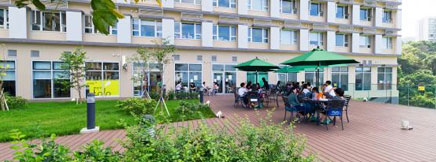On and Off Campus Accommodation
On-Campus Accommodation
Undergraduate Students
The University provides term-time on-campus accommodation to eligible undergraduate students. Students are allocated to a hostel place in their affiliated College or in the International House (I-House) managed by the Office of Student Affairs. If necessary, students can apply for summer accommodation to their respective college/ hostel as instructed.
Important Note:
Except for those affiliated to fully residential Colleges, non-local students are given the option to live on or off campus.
Morningside College, S.H. Ho College and CW Chu College adopt a fully residential and communal dining system. Students admitted to one of these three Colleges are required to live in the hostel during their undergraduate studies. For the other six Colleges – Chung Chi College, New Asia College, United College, Shaw College, Wu Yee Sun College and Lee Woo Sing College, non-local students can submit hostel applications to their respective Colleges, and their applications would be reviewed according to Colleges’ hostel selection criteria. For details, please refer to the latest announcement of your respective College.
Postgraduate Students
The Postgraduate Halls (PGH) offer more than 1,000 hostel places to postgraduate students. Due to limited hostel places, no on-campus accommodation is provided for students taking self-financed taught programmes or part-time programmes. For details, please visit the Postgraduate Halls Management Office Homepage or email to enquiry@pgh.cuhk.edu.hk.
University-endorsed Off-Campus Accommodation

We are pleased to introduce our first University-endorsed off-campus accommodation – Parkwood (link), a residential property developed and managed by Henderson Land.
You now have the opportunity to rent fully furnished units at competitive rates in a brand-new residential building located in a vibrant neighbouring district – easing your move-in process!
To support shared living arrangements, the University will assist in matching students with suitable roommates, ensuring that all roommates are CUHK students. Students’ sense of belong to the community will be enhanced by fostering a safe and secure living environment.
Enquiry: off-campus-accomm@cuhk.edu.hk
Parkwood also welcomes interest in renting from all full-time CUHK staff members. For further information, please contact Mr. Otto Ng from Henderson Land
(Email: otto.ng@hld.com / Tel: 9260 8836).
Photos of Sample Flat (provided by Henderson)
All CUHK Students Eligible
Double/ Triple/ Quadruple Rooms
HK$5,335 - $5,950/month per bed + deposit
One Year
Tai Po District (Near MTR Tai Wo Station)
click to see the map
(Limited Places Available)
Self-arranged Off-Campus Accommodation
Introduction
Finding off-campus accommodation in Hong Kong can be a challenge as you may not understand the local law and the rental procedure well. Also, the rent for a private apartment in Hong Kong is relatively high and many landlords tend to consider only leases of at least one year. Yet, living off-campus could be fun – you will enjoy more freedom and have a chance to taste the local culture.
It is erroneous to assume that the first step of renting an apartment is the inspection of the flat. Before searching for apartments, you must understand thoroughly the Landlord and Tenant (Consolidation) Ordinance and the rental procedure. This website provides CUHK members with information related to rental accommodation outside of the CUHK campus. Get prepared!
Finding Off-campus Accommodation
Step 1: Preparation
- Collect Relevant Information
- Understand the geographic and demographic distribution of the 18 districts in Hong Kong
- Browse the websites of licensed estate agencies to know the rental market (e.g. transaction records, properties to let, etc.)
- Know the estimated rental in the vicinity of the CUHK campus
- Know Your Criteria
When you have a general idea of the local rental market, you need to know your criteria, for example:- Size of the flat
- Budget
- Facilities
- Location
- Transportation
- Safety
- Understand the Ordinance and Tenancy Matters
You are recommended to read the following guidelines/ guidebooks:- Tenancy Guide for Non-local Students in Hong Kong – Estate Agents Authority
- A Guide to Tenancy – Estate Agents Authority
- A Summary Guide on The Landlord & Tenant (Consolidation) Ordinance – Rating and Valuation Department, HKSAR
- Other Useful Information
Step 2: Looking for an Apartment
- Appoint a Licensed Agent
It is common in Hong Kong to appoint a licensed estate agent to help find the right property. They usually have adequate resources and can select properties for inspection based on your criteria. They can also verify the landlord’s identity and property status, assist you in negotiating the terms of tenancy and entering into an agreement, etc. Their license is regulated by the Estate Agents Authority. Before appointing an estate agent, please read the website Be Smart in Appointing Estate Agents, and check the validity of the agent’s license here.
- Search for Residential Properties
If you choose not to appoint an agent, you can look for properties with the help of trustworthy friends, family and relatives, senior students and classmates, or search on online platforms, websites and social media. You should avoid renting industrial or commercial properties, and should also beware of subdivided units commonly seen in the rental market, which may involve unauthorized building works and safety hazards. When you have selected a suitable property, please do not rush into any payment or agreement. Paying less attention can lead to unfair deals and losses.In addition, some local property developers and real estate agencies are offering special deals exclusively for CUHK students, including short-term and long-term stay options. You can find more details on these CUHK student-exclusive offers at this link.
- Verify the Identity of the Landlord and the Property Status
When you are ready to enter into a tenancy, you can check the land records of the property to ascertain who the registered owner of the property is and if there are any encumbrances registered against it. Particular attention should be paid to mortgaged properties, public rental housing and flats under subsidised housing schemes.
- Mortgaged Property
- The owner of a mortgaged property should seek the mortgagee’s prior consent to the letting of the property. Where this consent has been obtained, you should learn about its conditions, if any. A property that is let without the mortgagee’s consent may be recovered by the mortgagee, and as a tenant, you face the risk of being evicted within a fairly short period.
- Public Rental Housing and Flats under Subsidised Housing Schemes
There are leasing restrictions for certain types of residential properties in Hong Kong. For example, subletting is not allowed in public rental housing (click here for details) and the renting of flats under subsidised housing schemes such as the Home Ownership Scheme is subject to the Housing Ordinance (click here for details).
- Visit and Check the Properties
- To bring a friend or relative to view the apartment with you
- To examine the apartments’ layout, view, material used, renovation, public facilities, club house, environment, fire prevention facilities, fire escape, etc.
- To try to inspect the apartment during day time so that you can check the apartment from inside to outside
- To observe the following points:
- Furniture and electric appliances are in good condition
- Lockset, doorbell, and peep-hole are functional
- Front door and all bedroom doors are working properly
- Windows, window locks, and curtain rails function well
- Any water leakage or cracks on the window-ledge?
- Bathroom
– Any water drains from the house?
– Wash hand basin and bathtub are functional
– The toilet bowl is in good condition
– Any water leakage from the toilet bowl?
– The flush in the toilet bowl works properly
– The electric water heater is functional - Living Room and Bedroom
– Any moisture, mold, pop-up, crack, and fleas are found on the floor?
– Is the surface of the floor smooth or cracking? - Kitchen
– Are the gas pipes in safety condition?
– Is the stove working properly?
Step 3: Signing a Tenancy Agreement
- Negotiate the Terms of Tenancy and Check if Agreed Terms are Stated Clearly
You and your landlord are generally free to agree on the terms of the tenancy as long as they do not contravene the Landlord and Tenant (Consolidation) Ordinance. Contents of the tenancy agreement usually include the following:
- Lease Term
- Deposit
- Rent
- Rent-free Period
- Expenses Other Than Rent
- Stamp Duty
- Right to Terminate
- Maintenance and Repairs
- Subletting
- Break-clause
- Tenancy Renewal
- Furniture and Electric Appliances Provided by the Landlord
- General and Implied Obligations
Before you negotiate with the landlord/ estate agent the terms of the tenancy agreement, please take reference to the Notes on Signing a Tenancy Agreement by Community Legal Information Centre (CLIC) and the Monograph: Hong Kong Domestic Tenancy by the Estate Agents Authority. For samples of the tenancy agreement, please check Sample 1 and Sample 2.
In addition, you may check the following tips for signing the tenancy agreement:
- Take some time to read the tenancy agreement thoroughly and carefully. Insist on doing so even if the landlord/ estate agent is not willing.
- To avoid breaking any of the clauses in the tenancy agreement, do not agree to anything which you cannot honour. Instead, tell the landlord you do not want that paragraph in the agreement. Make sure any amended clause or paragraph has been initiated by both the landlord and the tenant.
- If you want to share the accommodation with friends, make sure that you get permission from the landlord. If there is an express clause on the tenancy agreement indicating not to sublet, remember to cross it out and add the signatures of the landlord and tenant in the margin near it. It should be noted that whoever signs the tenancy is responsible for paying the rent and any breaches of the agreement. If you do not wish to assume sole liability, make sure that all persons living there sign the agreement.
- Report defect of the apartment to the landlord/ estate agent and request repairs. You may take time-stamped photos for record purpose.
- Receive the keys to the property on the same day of signing the tenancy agreement.
- Pay the Deposit/ Rent/ Agent’s Commission (if hired)
You need to know clearly what fee you are paying, and whether it is refundable, and if yes, whether it is clearly written in a proof document. Make sure that you do not pay any extra or excessive charges. After paying any fee, remember to get a receipt from the landlord/ estate agent.
Keep a Copy of the Tenancy Agreement with Stamp Duty Paid
The landlord, tenant and any other persons signing the tenancy agreement are liable for payment of stamp duty. An unstamped tenancy agreement shall not be received in evidence in civil proceedings and cannot be filed or acted upon by any public officer or any body corporate. For stamping procedures and explanatory notes, please click here. Both the landlord and the tenant should respectively keep a copy of the tenancy agreement and the Stamp Certificate.
Step 4: Moving in
- Open Utilities Accounts and Furnish the Apartment
If the utilities are not handled by your landlord, you need to open water, electricity and gas accounts and pay the bills regularly. To see major utility services, please click here (Useful Links > About Tenancy Matters > Utilities). The furnishing of the properties may vary from nothing to full-furnishing. If you need to furnish the apartment, you can find common items in the various major furniture and home appliance shops.
- Always Know the Rights and Duties during the Tenancy
Certain rights and duties are implied in a tenancy unless there are contrary provisions in the tenancy agreement. For example, using the property in a reasonable and proper manner is one of your implied duties.
Implied covenants of the landlord:
- Tenant to have quiet enjoyment of the property
- Fitness for habitation
- Landlord not to derogate from his grant
Implied covenants of the tenant:
- To pay rent on the due date
- To repair and maintain the property’s interior
- To pay rates
- To use the property in a ‘tenant-like’ manner
- Not to commit waste
- To yield up vacant possession of the property upon expiry of the tenancy
For more on the implied rights and duties of the landlords and the tenants, please click here.
More useful links
About Hong Kong
- Hong Kong maps
- Know the geographic and demographic distribution of the 18 districts in Hong Kong
- Know Hong Kong’s transport:
Accommodation Options Besides Rental Properties
About the Rental Market
- Know the estimated rental in the vicinity of CUHK campus
- Know the market by referring to property agencies’ websites
- Property agencies with more branches
About Tenancy Matters
Guidelines/ Ordinance
- Tenancy Guide for Non-local Students in Hong Kong – Estate Agents Authority
- A Guide to Tenancy – Estate Agents Authority
- A Summary Guide on The Landlord & Tenant (Consolidation) Ordinance – Rating and Valuation Department, HKSAR
Property Status
- Know the property status by checking the land records – Land Registry, HKSAR
- Check rental restrictions on public rental housing and flats under subsidised housing schemes – Housing Authority, HKSAR
Estate Agent
- Notes on Appointing Estate Agents – Estate Agents Authority
- Be Smart in Appointing Estate Agents – Estate Agents Authority
- Check the validity of the agent’s license – Estate Agents Authority
Tenancy Agreement
- Notes on Signing a Tenancy Agreement – Estate Agents Authority and Consumer Council
- Stamping Procedures and Explanatory Notes – Inland Revenue Department, HKSAR
- Tenancy Agreement (Sample 1 | Sample 2)
Utilities
- Water Supplies Department, HKSAR
- CLP Power Hong Kong Limited
- HK Electric Investments Limited
- The Hong Kong and China Gas Company Limited (Towngas)
- Registered Gas Supply Companies List (including LPG) – Electrical and Mechanical Services Department, HKSAR
Other References
- Renting a Domestic Property – GovHK Website
- Tenancy Matters FAQ – Rating and Valuation Department, HKSAR
- Be Smart in Appointing Estate Agents (FAQs) – Estate Agents Authority
- Monograph – Hong Kong Domestic Tenancy – Estate Agents Authority
- Landlord & Tenant – Community Legal Information Centre
- E-package: DIY Residential Tenancy Agreement – Community Legal Information Centre
- Unauthorised Building Works – Buildings Department, HKSAR
Advice and Assistance
- Tenancy Services Section, Rating and Valuation Department, HKSAR
- The Duty Lawyer Service, HKSAR (free legal advice)
- Small Claims Tribunal
Source of Information
- The Land Registry, HKSAR
- Renting a Domestic Property– GovHK Website
- Tenancy Guide for Non-local Students in Hong Kong – Estate Agents Authority
- Stamping Procedures and Explanatory Notes – Inland Revenue Department, HKSAR
- Landlord and Tenant – Community Legal Information Centre
- Monograph – Hong Kong Domestic Tenancy – Estate Agents Authority
Terms of Using the above information and disclaimer
The content on this website is compiled by the Learning and Cultural Enhancement Section (LCES) of the Office of Student Affairs for CUHK members’ general reference. This website can also contain information contributed by others, and links directing to other websites. Users are responsible for making their own assessment of all information contained on this website and all related information in the links before acting upon it.
The LCES reserves the right to omit, suspend or edit all information compiled by the LCES on this website at any time in its absolute discretion without giving any reason or prior notice. The LCES has no relation with any agent and is not responsible for any loss or damage whatsoever arising out of or in connection with any information including data or links on this website.




